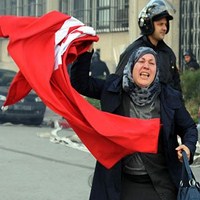Two and a half years after Tunisia launched the wave of uprisings that spread across the Arab world, the North African country still provides the best hope for the establishment of a sustainable democracy in the region. The development of Tunisia’s transition has been fraught and at times precarious, but at critical moments the country’s political evolution has displayed a self-correcting character. Every time Tunisia has confronted the risk of a breakdown of politics or the fracturing of society, it has managed to pull back from the brink. Tunisia remains dangerously polarized, but the country’s political and social groups have so far just about managed to keep the tensions between them within the nascent political system, rather than letting them break apart the system as a whole.
The transition in Tunisia continues to face a number of risks. In the short term, Tunisia must deal with the impact of developments in Egypt. The Egyptian army’s forceful deposition of President Mohammed Morsi and the broader social backlash against the Muslim Brotherhood’s political dominance have created cross-currents that are rocking Tunisia and threatening to exacerbate the country’s pre-existing tensions. There is also a continuing shadow of political violence, though it has receded somewhat since the killing of the leftist political leader Chokri Belaid in February 2013. Most fundamentally, perhaps, there is a danger that the country’s slow pace in realizing any tangible benefits from the revolution may create a crisis of unmet expectations. Fundamental reform of the state has hardly begun, and Tunisia’s economic and social problems loom as large today as they did in the period before the country’s revolution took place.
These challenges are real, but they shouldn’t detract from the significance of what Tunisia is on track to achieve. The country is close to agreeing on a new constitution that seems likely to have the support of most of Tunisia’s political groups. Assuming the constitution is approved in the next few months, it would be followed by presidential and parliamentary elections, perhaps early next year. If this process can be completed without any major disruption, it would mean that Tunisia had succeeded in overcoming one of the fundamental difficulties that the post-revolutionary transitions in the Arab world have faced (.pdf): building consensus on the ground rules for a new political settlement, in societies where there was no pre-existing mechanism for mediating between social groups with widely differing beliefs, affiliations and interests.

